Message from the Director of the International Water Law Academy
Professor Patricia Wouters
Welcome to this special issue of our Substack Newsletter ‘News and Views’ with a special focus on RESEARCH. And we have a special treat for you – see the attached list of monographs published by our Academy Affiliates. Please feel free to share widely. It has been a busy season! Through October and November, IWLA activity has focused on leveraging the positive energy and global engagement achieved in September through our official launch, hosted at Wuhan University September 15-16. Building on the momentum catalysed at this inaugural event, the Academy now takes a deep dive on research – capturing, developing, and disseminating this game-changing work in ways that contribute to enhancing transboundary water cooperation and meeting the UN SDGs. As a special feature of this issue of the Academy’s News & Views – we have compiled a list of some of the monographs published by our Affiliates, aimed at sharing the Academy’s scholarship.
‘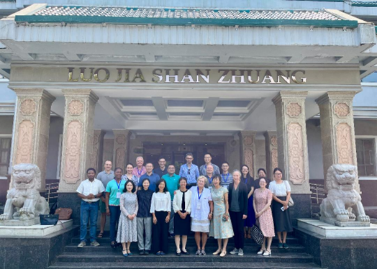
The Academy’s Charting a Path Initiative (CAPI)
In 2020 the Academy introduced its Charting a Path Initiative (CAPI) to 2030 and Beyond, to examine issues like climate change and equitable use to seek responses and solutions to the problems facing transboundary water management. In Wuhan, through CAPI, we explored how convergent rules of international law contribute to transboundary water cooperation and the Water Action Agenda established at the UN Water Conference in New York in March 2023, and collectively identified where and how the IWLA can make a practical difference.
Integral to CAPI is impact, through research and active outreach. Scholarship from the Wuhan conference and CAPI is forthcoming in a collected work to be published in a highly ranked SSCI journal. The Academy will also participate in a new Working Group on Water Law facilitated by the World Bank. Plans are already underway for the Academy to convene meetings and events to disseminate our research findings to a broad range of stakeholders, policy-makers and practitioners. Below is a summary of the key outcomes of the Academy’s Wuhan meeting, the foundation for our workplan as we go forward.
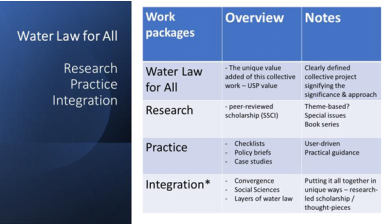
A focus for 2024 – Community, Convergence and Due Diligence
Follow-up Meetings
The IWLA Wuhan Conference has been the catalyst for a follow-on series of meetings to be planned and hosted at other academic institutions within China and abroad. The University of Edinburgh Law School will host an expert meeting on two key topics presented at the Wuhan conference – the important and complex issues of convergence of international (water) law and, the legal issue of due diligence. Both topics will form the substance of scholarship and expert academic meetings planned for 2024. Meetings are also planned in Hong Kong and Shenzhen.
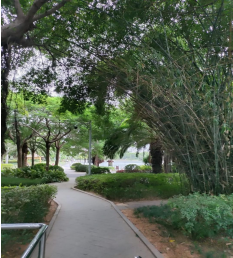
Project on Convergence
Participants at the Wuhan meeting suggested that a legal project on Convergence could be undertaken in a series of research works, developed through workshops and expert meetings under the leadership of Prof. Owen McIntyre, with support from Prof. Kong Lingjie and Prof. Patricia Wouters. This comprehensive project would require funding and strategic vision, which the IWLA agreed to take forward. The Edinburgh conference set for end of June/first of July 2024 will include one day on this topic.
Special Issue – Journal of Energy and Natural Resources (forthcoming 2024/2025)
The conference also provided the focal point for identifying important research topics. There will be a special issue to be published in 2024 by the Journal of Energy and Natural Resources with Taylor Francis as Publishers, Don Smith as Managing Editor and Prof. Patricia Wouters and Dr. David Devlaeminck and Dr. Ana-Maria Daza Clark as guest editors. The central theme of this collected work will be ‘Community in international (water) law, drawing on the inaugural lecture on this topic given by Prof Wouters at the Wuhan conference.
Working Group on Water Law – Global Forum on Law, Justice and Development, World Bank
Dr. Christina Leb, Senior Counsel at the Environment and International Law Department (LEGEN) of the World Bank has been in contact with the meeting participants about creating a Water Law Working Group under the Global Forum on Law, Justice and Development (GFLJD) housed at the World Bank. “The initial idea was to make this a nimble working group mostly focused on knowledge exchange between the various centres of expertise and individual experts working on international water law and to link to water practitioners. Depending on how the Working Group evolves, interested members could identify joint work on knowledge products.” The GFLJD Charter provides for a 2-year lifetime of working groups. In practice, groups continue to exist much longer, depending on their self-defined work program.
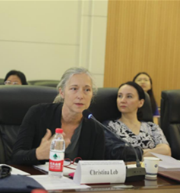
Dissemination of Research
Dissemination of research is essential and a core mission of the Academy. The IWLA Wuhan Conference resulted in a series of follow-on projects, including forward-looking scholarship, research projects and stakeholder supportive products, such as check-lists and practice guides. This builds on past works, such as the Academy’s policy brief on the integrated water law approach to transboundary water cooperation, produced in conjunction with Central Asian partners and disseminated at the New York UN World Water Meeting. In addition to the guides, IWLA’s research is disseminated on social media sites -- LinkedIn, Twitter (now called X) and WeChat. Publications are another avenue of research dissemination and attached to this newsletter is a selection of some of the monographs and books written by our global affiliates – please share this widely! Meetings are another way of communicating our research results to a wider audience involved in water management.
In 2023 our affiliates presented their research at the following meetings:

The UN Water Conference, New York, March 21-22, 2023
· Expert Meeting on Hydropower, Bologna University, Bologna Italy, March 9-10, 2023
Prof. Alistair Rieu-Clarke, Prof. Owen McIntyre, Ana Maria Daza-Clark, Prof. Patricia Wouters
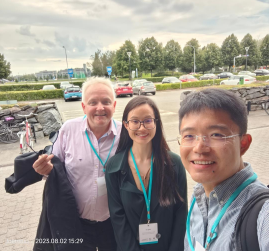
IWLA delegates Prof. Owen McIntyre, Dr. Yang Liu and Chenjun Zheng at
The IUCN AEL Colloquium in Joensuu Finland July 31-August 4, 2023
· The World Water Week, Stockholm, August 20-24, 2023
Susanne Schmeier, Yumiko Yasuda, Sylvester A. Matemu
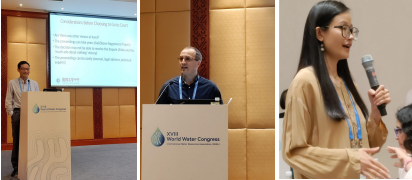
Above IWLA delegates presenting at the International Water Resources Association World Water Congress, Beijing, China, September 11-15, 2023.
From left to right: Prof. Kong Lingjie, Dr. David Devmaelinck and Dr. Yang Liu
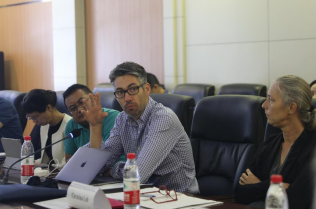
Prof. Alistair Rieu-Clarke making an intervention at the IWLA Meeting,
Wuhan University, Wuhan China, September 15-16, 2023.
Emerging Scholars Initiative
One of the key outcomes and aims of the IWLA Wuhan event is the generation of new, peer-reviewed scholarship. Under the CAPI’s Emerging Scholars Initiative, there was a global call for contributions from young scholars, which resulted in a special issue of the Journal of Water Law, announced at the IWLA Conference and soon to appear: “Charting a Path to 2030 and Beyond: Voices from Emerging Scholars in International Water Law” (editors, Professor Patricia Wouters, Dr David Devlaeminck, IWLA).
Below from left to right: Luc Kizito Cimanuka. Ms Yin Myo Su Hlaing, Dr. Yang Liu and Dr. David Devlaeminck at a PhD meeting at Wuhan University.
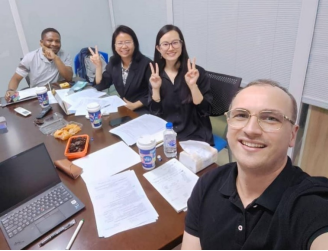
Below we highlight the research of two of our PhD students at Wuhan University (CIBOS), Ms Yin Myo Su Hlaing and Mr. Jean Luc Kizito Cimanuka
Interview with Ms. Yin Myo Su Hlaing, IWLA PhD Student
Q1.How did you become interested in international water law?
I am from Myanmar, which has more than five transboundary rivers with its neighbouring States such as China, India, Thailand and Bangladesh. Myanmar is also a member of the Association of Southeast Asia Nations (ASEAN) and a member of Lancang-Mekong Cooperation, which is a framework for cooperation for various issues in the Lancang-Mekong basin providing for meetings and cross-border cooperation on water resources, agriculture and poverty reduction, and economic issues. Around the world, the equitable and sustainable use of waters and the prevention of the significant harm to other watercourses States is very important for the benefit of present and future generations. Because of these regional and transboundary perspectives, I became interested in International Water Law.
Q2. What is the topic of your PhD thesis and how did you choose it?
My PhD thesis is related to Due Diligence in the context of Transboundary Waters. The reason why I chose the rule of due diligence is that it is very important as a general principle of law and because the preservation of natural resources is a state responsibility under customary law. In addition, international courts apply the rules of due diligence in the conflicts between States. I chose this topic so that I could examine its applicability to Myanmar’s International Watercourses.
Q3. What would you like to do when you finish your PhD?
As I am working at the Ministry of Legal Affairs, when I finish my PhD, I will go back to Myanmar and see how I can apply my research to my work. My work does not directly relate to determining policy; however, I am able to make legal suggestions to governmental institutions who are responsible for making policy. So, I hope that my study, the rule of Due Diligence in Transboundary Waters, will contribute to the sustainable use of Myanmar transboundary waters and the prevention of significant harm of natural resources within and beyond its territory. If I know about International Water Law, I can effectively contribute to both my country and to regional development.
Interview with Jean-Luc Kizito Cimanuka, PhD Student, IWLA
Q1. How did you become interested in International Water Law?
Up to my master’s degree, I worked in the field of business law, but by the time I reached PhD level, I was faced with the choice of whether to continue in business law or to work on international water law, which was really my vocation. I chose international water law and began my PhD at the China Institute of Boundary and Ocean Studies at Wuhan University. Over and above the importance of water for mankind and the current issues surrounding water resources, particularly in the Congo Basin, where I come from - with the 2nd largest river in the world with an immense hydrographic network - and the need to increase cooperation between the states in this basin, the question of water law had always been of a focus for me. By studying this field, I aim to contribute to the establishment of shared management practices that promote cooperation between the basin states and guarantee the equitable and sustainable use of water resources.
Q2. What is the topic of your thesis and how did you choose it?
My research topic is: "Towards the Sustainable use of Congo River Basin - a legal analysis of existing and future challenges". I chose this theme after analysing the situation on the ground, I found that integrated management was not effective throughout the basin and strengthening cooperation between basin would start with the development of international water law by the member states.
Q3. What would you like to do when you finish your PhD?
I intend to devote myself mainly to teaching and research, and to contribute as much as possible to the promotion of International Water Law in the Democratic Republic of Congo and elsewhere where I can. I am also continuing my work as a lawyer, which I have been practicing since 2017 in Kinshasa.
Thank you to our PhD students for their interviews and to all our affiliates for your participation in research in International Water Law and your contributions to the achievement of the Sustainable Development Goals and the Water Action Agenda. We look forward to our upcoming activities in 2024!

Communications Team:
Dale Campbell, Dr. Yang Liu and Tian Yunhe
Affiliates – share your news with us for future issues of
Substack News & Views, email us at: Dale.IWLA@proton.me
![]() Tel: 86-027-68756726
Tel: 86-027-68756726
![]() Address: Wuhan University China Institute of Boundary and Ocean Studies (CIBOS), P.R. China,
Address: Wuhan University China Institute of Boundary and Ocean Studies (CIBOS), P.R. China,
© International Water Law Academy. All Rights Reserved.